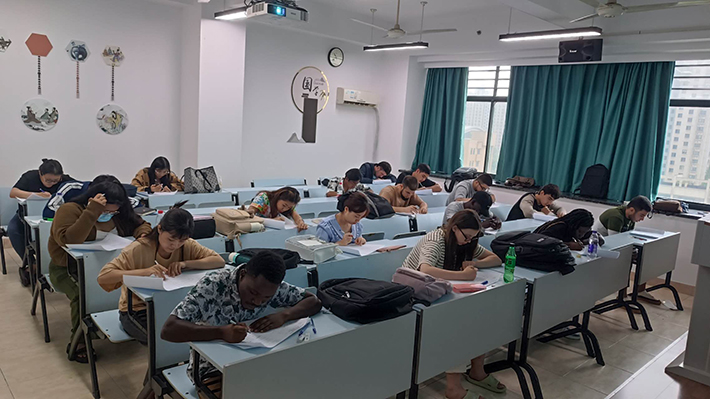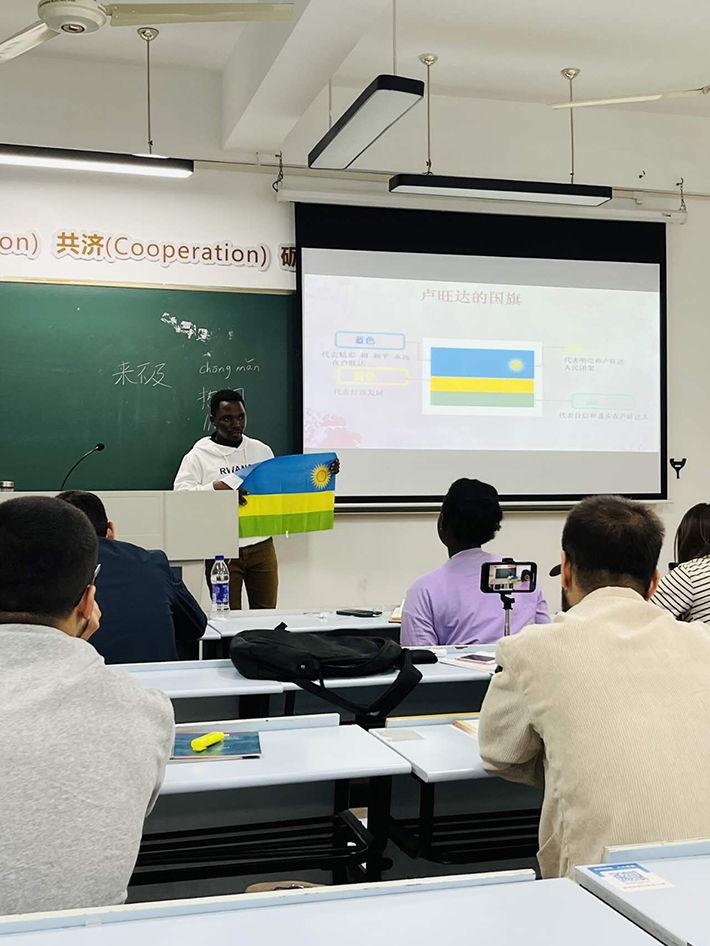|
||||||||||
| Home Nation World Business Opinion Lifestyle ChinAfrica Multimedia Columnists Documents Special Reports |
|
||||||||||
| Home Nation World Business Opinion Lifestyle ChinAfrica Multimedia Columnists Documents Special Reports |
| ChinAfrica |
| Institutes of Inspiration |
| Chinese learning surges in Rwanda as economic ties with China strengthen |
| By Alafati Mugabo | VOL. 16 March 2024 ·2024-03-22 |

Rwandan students of Chinese language attend a Chinese Bridge Camp in Kigali, Rwanda, in 2022
In the full classroom of Rwanda’s Confucius Institute at the University of Rwanda, Remera campus, the echoes of “ni hâo,” “xiè xiè” and “nǐ jiào shénme míngzì?” reverberate alongside the scribbling of Chinese characters on chalkboards. The rise of Chinese learning in Rwanda underscores a flourishing trend fuelled by economic opportunities and cross-cultural exchanges between Rwanda and China.
Rwanda, renowned for its rich linguistic tapestry, is experiencing a notable shift as the Chinese language gains traction. Spearheaded by the Confucius Institutes, these hubs of language and cultural exchange are witnessing a remarkable surge in enrolment. Rwandans are increasingly recognising the economic advantages bestowed upon those proficient in the language of China.
With 14 Confucius Institutes spread across the country, Rwandans, both young and old, are seizing the opportunity to learn Chinese. From university campuses to primary schools, the allure of Chinese as a gateway to enhanced job prospects and business opportunities is undeniable.
Marie Claire, a testament to the transformative power of the Confucius Institute, underscores the pivotal role these institutions play in shaping lives. “Without the Confucius Institute, I wouldn’t be a Chinese teacher in Rwanda today,” she said. Her journey from a Confucius Institute scholarship recipient to a proficient Chinese teacher exemplifies the institute’s impact on individual trajectories.
Reflecting on the blossoming interest in Chinese, Beatrice Yanzigiye, director of the University of Rwanda branch, observes a steady rise in enrolment over the past decade. “More than 7,000 students are currently enrolled in Chinese classes, signalling a growing appetite for Chinese proficiency,” she noted.

Chinese learners take a Chinese language skills exam
The economic aspect
The surge in Chinese learning mirrors Rwanda’s deepening economic ties with China, spanning diverse sectors such as construction, agriculture, medicine and infrastructure. As Chinese enterprises establish a foothold in Rwanda, fluency in Chinese emerges as a strategic asset for Rwandans seeking to navigate these growing business landscapes. Notably, government officials and business executives are among the ranks of students attending Confucius Institute classes, recognising Chinese as a catalyst for economic growth and bilateral cooperation
For Perfect Nduwayezu, a young professional navigating Rwanda’s corporate landscape, learning Chinese is a strategic move. “It is the best commercial language,” he affirms, highlighting the pragmatic appeal of Chinese in today’s global economy.
The economic rationale behind learning Chinese extends beyond individual aspirations to national development agendas. As Rwandan-Chinese cooperation deepens across various sectors, fluency in Chinese becomes a valuable asset for fostering bilateral relations and facilitating business ventures.
Gilbert Cyubahiro, a university student, echoes this sentiment, expressing her intent to leverage her Chinese proficiency for future employment opportunities. “Once I learn Chinese, I will use it to find jobs in Chinese companies here,” she asserted, embodying the entrepreneurial spirit driving Rwanda’s Chinese learning trend.
“As of today, there are Chinese companies in almost all sectors in the country, especially in infrastructure, mining and agriculture. With fluency in Chinese, a job is an automatic opportunity in these companies,” she added.
The success story of Nyandwi Oreste, known by his Chinese name Kong Ze, further underscores the tangible benefits of Chinese proficiency. Securing a higher-paying job at a Chinese construction company, Oreste credits his fluency in Chinese for elevating his earning potential and career prospects.
Despite the enthusiasm for Chinese learning, challenges persist, particularly the availability of proficient native Chinese teachers. Isac Tuyambaze, whose Chinese name is Tian Wei, highlights the importance of recruiting qualified Chinese instructors to meet the growing demand for advanced language education.
Tuyambaze specialises in alternative energy and initially worked in the electric department of a Chinese construction company in Kigali. He shared his journey of mastering the Chinese language amidst various challenges.
“Studying alternative energy at IPRC laid the foundation for my career trajectory. However, I encountered communication barriers, prompting me to seek proficiency in Chinese,” he recalls.
Tuyambaze’s determination led him to approach his boss for guidance, who eventually helped him enrol in the Confucius Institute to study Chinese. Balancing work and evening study sessions, he embarked on his Chinese language journey in 2019, achieving level-three proficiency through rigorous exams.
The onset of the COVID-19 pandemic in 2020 confined Tuyambaze to his home, but it also presented unexpected opportunities. “During the pandemic’s peak, I got a translation job in Uganda,” he said. Despite the challenges of adapting to a new environment, Tuyambaze remained steadfast in his commitment to mastering Chinese. Upon returning from Uganda, he continued his self-study journey, driven by a passion for the language.
Reflecting on the current landscape of Chinese language education in Rwanda, Tuyambaze emphasises a pressing issue: the scarcity of native Chinese instructors proficient in higher levels of the language.
“Many Rwandans, including myself, struggle to find suitable mentors for advanced Chinese language learning,” he lamented. With only level-three proficiency, local Rwandan teachers face limitations in catering to students aspiring to reach levels five and six.

A Rwandan teacher teaches Chinese language at the University of Rwanda, Remera campus, in Kigali
Return of teachers
Tuyambaze advocates for the return of permanent proficient Chinese educators to Rwanda, as it was before COVID-19, emphasising the invaluable role they play in fostering comprehensive language education. “The presence of native Chinese teachers is crucial for providing authentic language instruction and bridging the gap between basic and advanced proficiency levels,” he asserted.
Despite these challenges, ChinAfrica learnt that lessons are free for students at the University of Rwanda, while non-students must pay a one-time registration fee of 30,000 Rwandan francs ($24) to attend classes for two years.
Although the pandemic caused a drop in the number of students from 2020 to 2022, enrolment picked back up after face-to-face lessons resumed in May last year. As of October 2023, there were 780 students learning Chinese.
As Rwanda charts its course towards economic prosperity, the Confucius Institutes stand as beacons of opportunity, empowering Rwandans to navigate the complexities of the globalised world through language proficiency. With Chinese as a catalyst for innovation and collaboration, Rwanda’s embrace of Chinese language and culture heralds a promising future of mutual growth and understanding.
| About Us | Contact Us | Advertise with Us | Subscribe |
| Copyright Beijing Review All rights reserved 京ICP备08005356号-5 京公网安备110102005860号 |